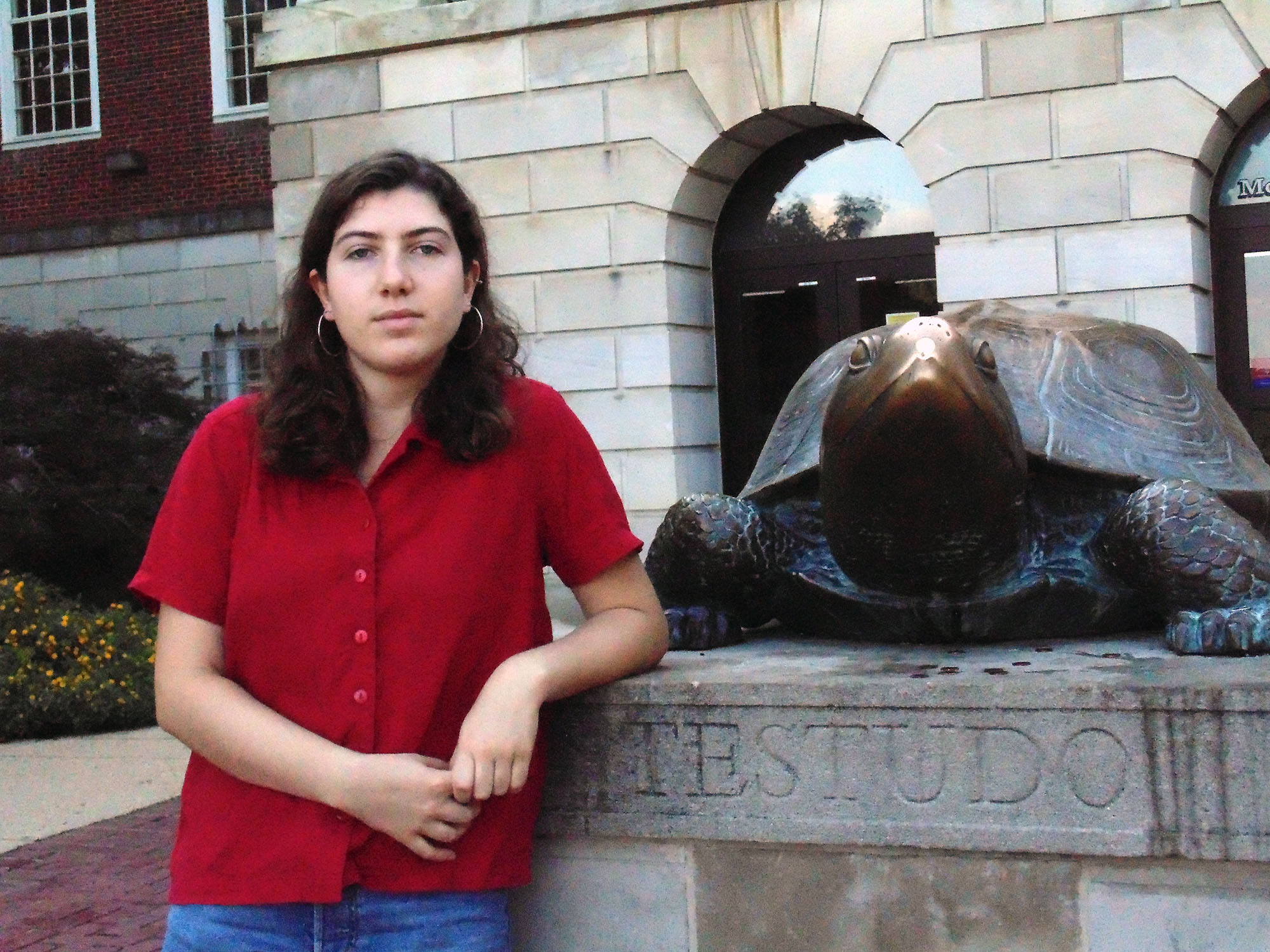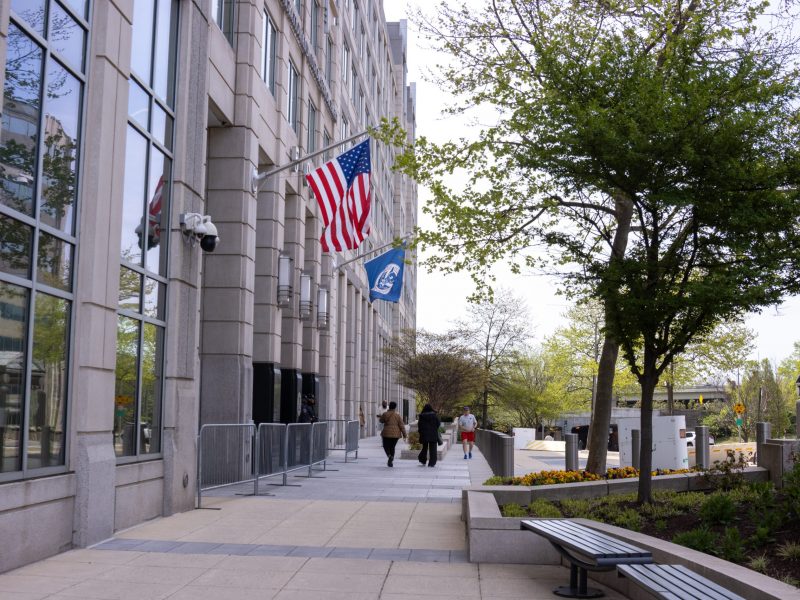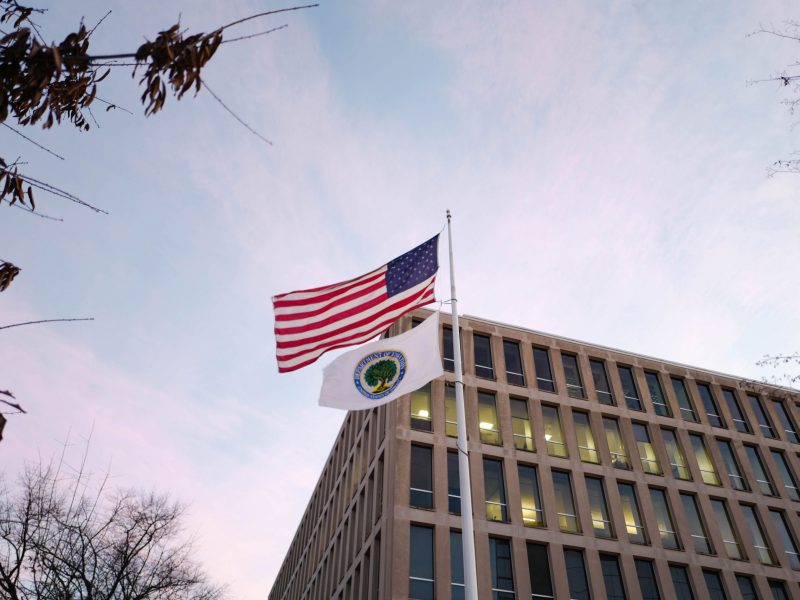On Thursday, University of Maryland student Hannah Robinson marched in the pouring rain from the Capitol Reflecting Pool to the Supreme Court building to protest Brett Kavanaugh’s nomination.
She reached the pool at about 12:30 p.m., and a group of protesters began to make their way to the nation’s highest court. Hours later, she found herself in handcuffs, one of nearly 60 arrested for civil disobedience for sitting on the street outside the court, she said.
“It was really empowering, after a long, hard week of reading the news,” the sophomore Jewish studies major said.
Robinson was arrested at about 2:30 p.m. and was bussed to a processing center in southwest Washington, D.C., she said. She had to pay a $50 fine, which was covered by protest organizers, she said.
Robinson was one of many University of Maryland students captivated by Thursday’s hearings of Kavanaugh’s alleged sexual misconduct in a Montgomery County bedroom.
[Read more: Gov. Hogan calls for investigation of sexual misconduct claims before Brett Kavanaugh vote]
Christine Blasey Ford, a psychology professor at Palo Alto University in California, accused Kavanaugh of sexually assaulting her in 1982, when the two were high school students in Bethesda, Maryland. Kavanaugh and Ford both testified before the U.S. Senate Judiciary Committee on Thursday. Kavanaugh has denied the allegations.
A Bethesda native herself, Robinson said the hearing hit home in more ways than one. She interned for one of Ford’s lawyers, Debra Katz, in January 2018.
“A lot of women around the country have felt angry and really powerless this week,” Robinson said. “It’s become clear what a lot of men in power think. I’m really pissed off.”
Ford was the first to come forward with allegations of assault by Kavanaugh, who was nominated in July by President Trump to replace retiring associate justice Anthony Kennedy. Since Ford’s letter — originally sent confidentially to Sen. Dianne Feinstein (D-Calif.), in July — leaked to the public, two additional women, Deborah Ramirez and Julie Swetnick, have come forward with similar accusations.
Rosie Wilson, vice president of this university’s College Republicans, said she believed both Ford and Kavanaugh.
“I believe [Ford’s] accusations of being sexually assaulted, but I also believe Judge Kavanaugh is not the one who did it,” the junior environmental science and policy major said. “She’s brave for reporting on something so incredibly traumatic … but it makes me pretty mad because she is being used as a partisan pawn.”
Bailey Dinman and Michelle Garda, both students at this university, took to the streets Thursday, too. The pair hoisted signs that said “Believe Women” and “KavaNOPE” as they worked their way inside the Dirksen Senate Office Building alongside a group of survivors and advocates from all over the country.
[Read more: Heading into October, some UMD students say they aren’t feeling engaged in governor’s race]
“It was probably the best day of my life,” said Garda, a junior international business and public policy major. “Being there myself was so powerful. … Seeing all these people that don’t agree with him come together, I think that’s comforting in itself.”
Dinman said the fact Ford got a hearing was a positive step in itself.
“You can’t ignore women anymore,” said Dinman, a senior government and politics major.
Emily Kaplan is working to ensure that. Last year, the senior economics and government and politics major co-founded this university’s chapter of Ignite, a group empowering women to run for office. She said she saw parallels in these hearings with the 1991 hearings of Anita Hill, who accused then-Supreme Court nominee Clarence Thomas of sexual harassment.
While Thomas was confirmed to the court, the next year’s elections saw a then-record number of women elected to the Senate.
“I think the tides are similar to 1992,” Kaplan said. “There’s still a huge underrepresentation of women in Congress.”
Sydney Poretsky, this university’s College Democrats president, said after viewing the hearings she wasn’t convinced the country had changed since 1992. Poretsky went to the Holton-Arms School in Bethesda — the same all-girls school that Ford attended when Kavanaugh allegedly assaulted her.
“What happened to Dr. Ford could’ve happened to me or one of my classmates,” Poretsky said. “It still happens. It’s a culture that doesn’t seem to have changed much since the 80s.”
Sophia Blake, a junior communication major and assistant president of Preventing Sexual Assault, said the hearings emphasized the need for more support for assault survivors, including more streamlined Title IX procedures at this university.
“If we can start on our campus, it’ll be a domino effect. We’re so close to D.C.,” said Blake. “We’re in such a good place to make noise about these legal issues because we’re at the heart of what’s happening right now.”
CORRECTION: Due to an editing error, a previous version of this article incorrectly stated that the protest began at the Lincoln Memorial Reflecting Pool. It began at the Capitol Reflecting Pool. A previous version of the caption of the photo for this article incorrectly stated that Hannah Robinson is a history major. She is a Jewish studies major. The article and caption have been updated.



